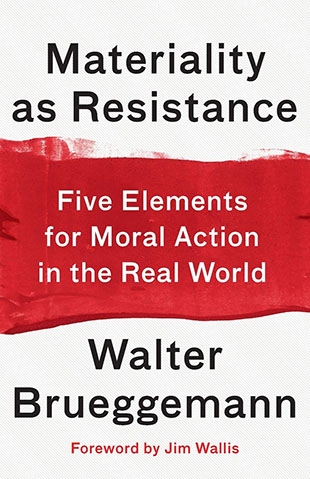In his sturdy and substantive foreword to Walter Brueggemann's latest paperback, Jim Wallis of Sojourners hails the author's "prophetic imagination" as he reflects upon five major elements for moral action in the real world. All too often Christian churches have tried to opt out of the messy and often intractable social and political issues of our times. They have preferred to focus on otherworldly matters. One of the major intentions of the author is "to reengage the materiality of faith after a very long run of avoidance." The author notes the points he intends to make in the introduction, which you can read on the publisher's website; included are some questions for group discussion.
Brueggemann begins with a critique of ideas and habits pertaining to money in a society consumed with materialism and consumerism. Some of the important subjects covered here include spending, saving, the Protestant work ethic, wealth and poverty, and the challenges of generosity and serving the common good.
In his critical reflections on food, the author laments a society where people are diminished by junk food, eating disorders, and obesity. He salutes the turn to eating locally grown food, the establishment of family farms, and the work of those who are accentuating the sacramental potential of eating.
In chapters on the body and time, we are treated to probes that shape and influence our daily lives. In the first, Brueggemann examines the required care of self and the covenantal practice of sexuality. Also included is commentary by Ta-Nehisi Coates on the persecution of blacks as a nightmare of body-snatching. In the chapter on time, we read about the importance of the Sabbath, the destructive aspects of speed, and the necessity of Christians to accept all time as a gift from God.
The most thought-provoking chapter is the one on place. Here the author uses the story of the Prodigal Son as a catalyst "to reflect upon what it means to belong to a home place with all its expectations, requirements, demands, and gifts. Such reflection may also lead to fresh awareness of the cost of being without such a place, away from home." With a flash of inspiration, the author spells out four dimensions of mature materiality of place as heir, neighbor, partner and citizen.
